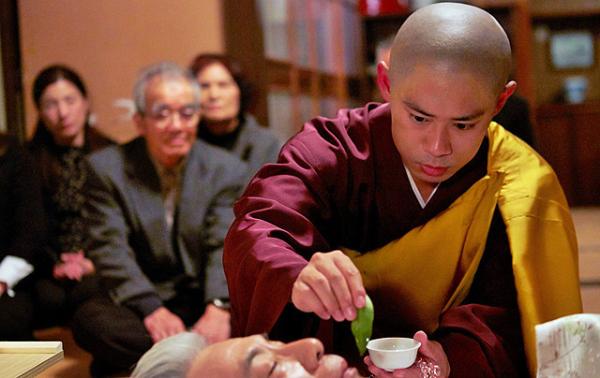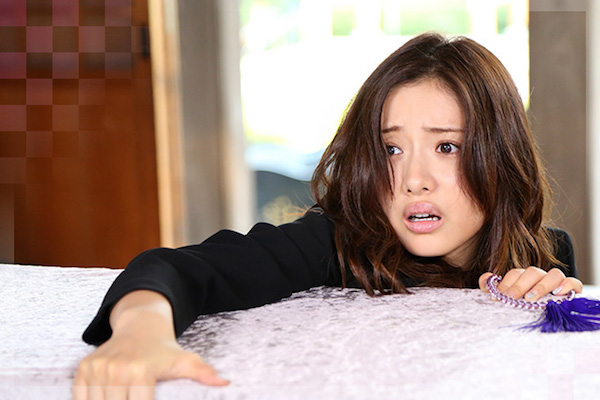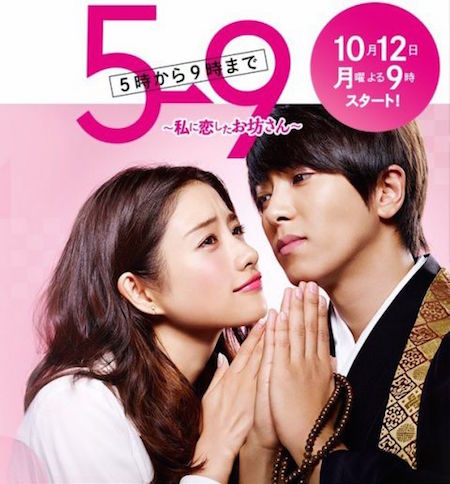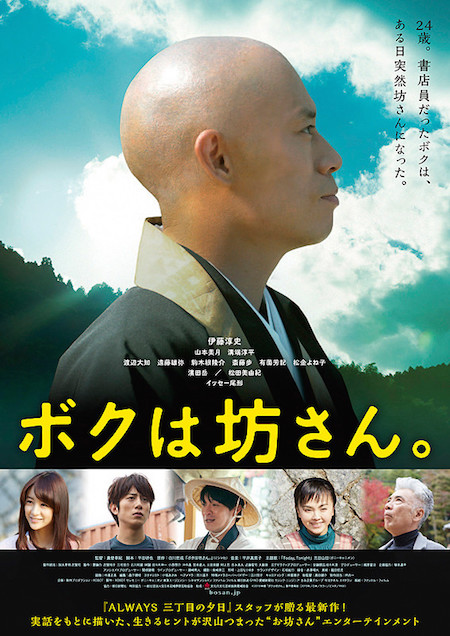Don’t be fooled by Japanese dramas, Japanese monks are not that rich.

In the movie "I am a monk", Shinshinjuku presided over the funeral.
Guang Yuan knelt on his knees, gently removed the white cloth covering the face of the remains, folded his hands, bowed his head for a week, and picked up fresh leaves soaked in a clear water bowl in his right hand (also known as "Japanese wild grass" and "grass before Buddha", which are commonly used in Japanese Buddhist ritual activities and are fragrant and poisonous, and are generally planted in temples. Legend has it that the master of Buddhism used it instead of utpala’s secret-repairing method, which resulted in the word "Fu"), wiping the slightly closed lips, and "Ganlu" moistened the whole body from the teeth. Afterwards, he twisted the prayer beads of Haitangsong and began to recite the "Pillow Sutra" (the Buddhist sutra beside the pillow is usually recited by monks during the vigil before the spirit or when they are dying. According to different sects, there are mainly Prajna Heart Sutra and Amitabha Sutra. It originated from the form of Sakyamuni’s last statement to his disciples before his death, but there is no such thing as "pillow sutra" in China’s Buddhist tradition) … This is a close-up of a scene in which the abbot Bai Fang Guangyuan (played by Atsushi It?), the hero of Shinrikyo, held a funeral for the Tanjia believers who just died, in the Japanese Buddhist film "I am a monk" released nationwide in October 2015.

In the Japanese drama "Fall in Love with My Handsome Monk", Runzi of the incense burner was knocked over at the Fa Conference.
Fans in Yamashita Tomohisa and Satomi Ishihara may remember that the Japanese drama "Falling in Love with My Handsome Monk" also kicked off at the funeral: Runzi’s family played by Ishihara attended the "First Seven Dharma Meeting" of an old friend, and Runzi, who was not used to kneeling for a long time, got up and knocked over the incense burner, thus opening a series of stories with Xingchuan, the handsome monk played by Yamashita. With the super popularity of Yamashita and Ishihara, the ratings of the first two episodes were quite high. However, with the development of the old-fashioned plot of "Girls’ Comics", the audience changed channels instead of handsome men and beautiful women, resulting in bad reviews at the end of the play.

Poster of Japanese drama "Falling in Love with My Handsome Monk"
In China, "Love" and "Monk" in the title seem to attract more attention than the face values of the male and female protagonists. Since the beginning of the drama in October, major domestic media have published different levels of popular articles, as if eager to introduce why Japanese monks can grow hair, marry and have children, and reveal the so-called "happy life". However, the combination of "love" and "monk" is not a topic in Japan at all-the "meat-eating wife belt" has long been a custom since the Meiji era-but another stunt of Xingchuan, "Fu", which caused many monks to protest after the second episode of the play was broadcast: "Fu Monk" misled the audience, because the income of most monks was only the general wage level, and even monks in small rural temples had to make ends meet.
Rich or poor, the question is where the Japanese monks get their money. The "handsome monk" seems to give people the impression that the temple will "make money" by itself, but it can have a private jet without seeing Xingchuan working. It’s just that the Yiqiao Temple in the lens seems to have never seen crowds of tourists. This is because most temples in Japan are not tourist attractions and don’t sell tickets! What about the "merit box" Of course, there is one in front of the main Buddha in the main hall. However, the Japanese are used to putting "Wu Yen" (about triangular RMB) in the merit box, on the grounds that Japanese "Wu Yuan" is homophonic with "Yu Yuan", and giving "Wu Yuan" in front of the Buddha symbolizes a good relationship with the Buddha and can make a good wish for themselves. If there happens to be no "five-yuan" coins in the coin purse, most people will replace them with ten or fifty-yuan coins, and rarely put in thousands of banknotes, even when praying in the New Year, they will not "throw ten thousand yuan" (about five hundred yuan). Therefore, the merit box can’t be a printing machine.
Fans at Yamashita may notice that apart from tracking and pursuing Runzi, Xingchuan’s main daily activity is "ritual". Before helping Runzi’s grandmother do a memorial ceremony for the 20th anniversary of her death, Xingchuan specially looked through all the video materials of her grandmother before her death, and asked her neighbors about her hobbies and habits, which was finally presented to Runzi’s family. It can be said that the "ritual ceremony" is the most important Buddhist factor running through this trend of Japanese drama-not the handsome robes of Xingchuan! For people who are not familiar with the current situation of Japanese Buddhism, this is actually a hidden point of view, because such a background shows the knowledge and understanding of modern Japanese, especially the main audience (young people) of this soap opera, on the traditional Buddhist culture of their own nation and country without leaving a trace.

"I am a monk" movie poster
What is Buddhism and what do monks do?
These two issues are also the fundamental issues related to Buddhist beliefs and the future of monks directly discussed in the film I am a monk. Kyoko (Mizuki Yamamoto), Guang Yuan’s childhood sweetheart, asked him when he learned that Guang Yuan was going to take over as abbot: "What will he do after becoming a monk?"
Although Guangyuan grew up in a monastic family, and studied at Shinsejong Takanoyama University, the only esoteric discipline in the world, and obtained the qualification certificate of "Ayali", he never made up his mind to become a monk. After graduating from college, he entered a bookstore as a salesperson. Until one day at the age of twenty-four, my grandfather, who was the abbot, died suddenly. There were no brothers and sisters and my father was a beautiful son in law, so I was faced with the choice of either taking over as abbot or transferring Rongfu Temple to others. Guang Yuan, who shaved his hair and changed his name to a monk, replied to Kyoko: "People only know that monasteries hold funerals, but the work of monks is not just a ritual." "What else do you do?" Kyoko then asked. "For example, doing homework every morning and evening, trimming Buddha statues and courtyards, designing new amulets and prayer beads, preparing for prayer ceremonies, and attending seminars of Buddhist associations and spiritual field associations …" Although Guangyuan cited many specific affairs, in Kyoko’s view, all the work of monks revolved around funeral rituals. Finally, Guangyuan had to ridicule and said, "A wedding is ok!" Later, Kyoko really chose his own Rongfu Temple as the wedding site, and asked Guangyuan to preside over the "pre-Buddha" wedding of Shinyan Sect —— the wedding ceremony of Japanese Buddhism was equally solemn. However, in fact, in recent years, few people are willing to hold traditional weddings in monasteries. One of the reasons is that it is against the jubilation in front of the "tombs".
After World War II, with the monks’ increasing attention to funeral rites, their economic dependence on the sale and maintenance of cemeteries, and their careful management of ritual activities such as memorial tablet sacrifice, the Japanese people ridiculed it as "burial Buddhism" and generally called temples "cemeteries", implying that Buddhism was too concerned about seeking money from the deceased to benefit the living. With the urbanization, modernization and declining birthrate of society, many Japanese people only really enter temples and get in touch with monks when attending farewell ceremonies of relatives and friends, memorial ceremonies and festivals. More and more young people don’t even think it’s a big deal to cause death. They think that the high funeral expenses paid to monasteries are a waste of money (the national average is 600,000 yen, about 30,000 yuan). Simple "direct burial" (direct cremation without vigil and funeral) has become a new fashion. Nearly 30% people in Tokyo choose "direct burial" every year because of low income and lonely families.
Most Japanese monks resist the name of "burial Buddhism", thinking that this statement overemphasizes the temple’s dependence on funeral rituals to make money, ignoring the important significance of Buddhism to life and daily life. However, for example, every episode of "The Handsome Monk in Love with Me" is set in the narrative background of ritual and dharma meeting, and Granny Xingchuan regards Tanjia as the "Buddha" with strict regulations and diligent service. The main work contents and ways of making money revealed in these scenes are actually a true portrayal of contemporary Japanese Buddhism. I am a monk, on the other hand, intends to stand in the position of a monk and explore the role and significance of Buddhism to modern people and society beyond this social doubt. Guangyuan and Gao Yeshan University students, both monks, seriously discussed: "How long can the temple funeral last? Without funeral rites, what will the monk do? "
Although ridiculed or even criticized, for the Japanese who take Buddhism as their traditional belief, "burial Buddhism" has irreplaceable religious significance besides formally bidding farewell to the dead and comforting the living with peace of mind. Most of the major sects of Buddhism in Japan practice "giving a ring to become a Buddha after death". The leaves, clear water and pillow sutra in the close-up of "I am a monk" all have special symbolic meanings. The last procedure of the ceremony is to give the deceased a "ring name" (also known as "dharma number"), which is the name and symbol of becoming a formal Buddhist disciple. Originally, it was the name that the living got when they were ordained to the Buddha. Due to the influence of the idea of becoming a Buddha after death, it is popular in modern Japan to give rings to the dead. Many monasteries can also give different levels of ring names according to the amount paid, such as lay, Daiyu, courtyard number, etc.), so that they can become formal Buddhist disciples, thus moving towards liberation and no longer falling into hell. Pure Land True Sect advocated "no precepts" in doctrine, so the funeral ceremony didn’t give a ring, but the monks prayed for the dead to die in the western paradise under the blessing of Amitabha and Zongzu Qinluan.
Guangyuan resisted the word "burial Buddhism" which smelled of copper, formalized and secularized since he was a child. It was not until he first faced the body and his family alone and sang the Heart Sutra that he realized that "the existence of monks is necessary!" Life and death are connected by solemn ceremonies. The professional "burial Buddhism" is not a one-time "sale", but a ritual system that makes faith concrete, endows abstract emotions and energy with practical operation, and inherits invisible ideals and beliefs with visible secular life, thus benefiting life for a long time.